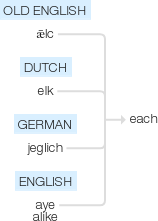Each
Old English ǣlc ; related to Dutch elk and German jeglich, based on a West Germanic phrase meaning ‘ever alike’ (see aye2, alike).
wiktionary
From Middle English eche, from Old English ǣlċ, contraction of ǣġhwylċ(“each, every, any, all”), from Proto-Germanic *aiwô(“ever, always”) + *ga- + *hwilīkaz. Compare Scots ilk, elk(“each, every”), Saterland Frisian älk(“each”), West Frisian elk, elts(“each”), Dutch elk(“each”), Low German elk, ellik(“each”), German Low German elk, elke(“each, every”), German jeglich(“any”).
etymonline
each
Old English ælc (n., pron., adj.) "any, all, every, each (one)," short for a-gelic "ever alike," from a "ever" (see aye (adv.)) + gelic "alike" (see like (adj.)). From a common West Germanic expression *aina-galīk (source also of Dutch elk, Old Frisian ellik, Old High German iogilih, German jeglich "each, every"). Originally used as we now use every (which is a compound of each) or all; modern use is by influence of Latin quisque. Modern spelling appeared late 1500s. Also see ilk, such, which.
